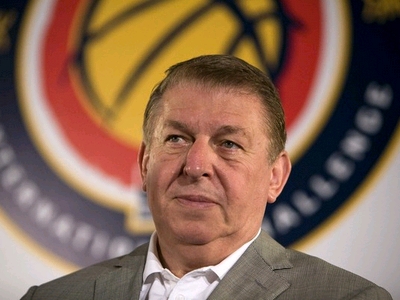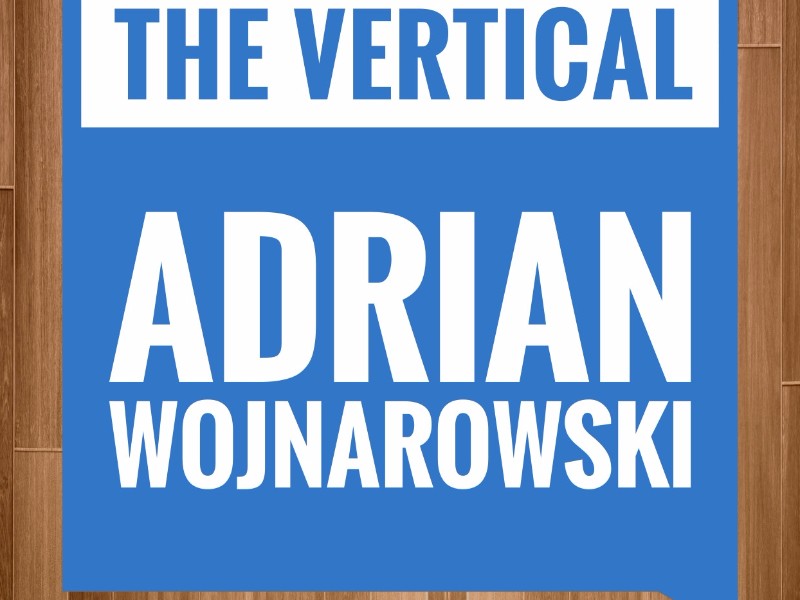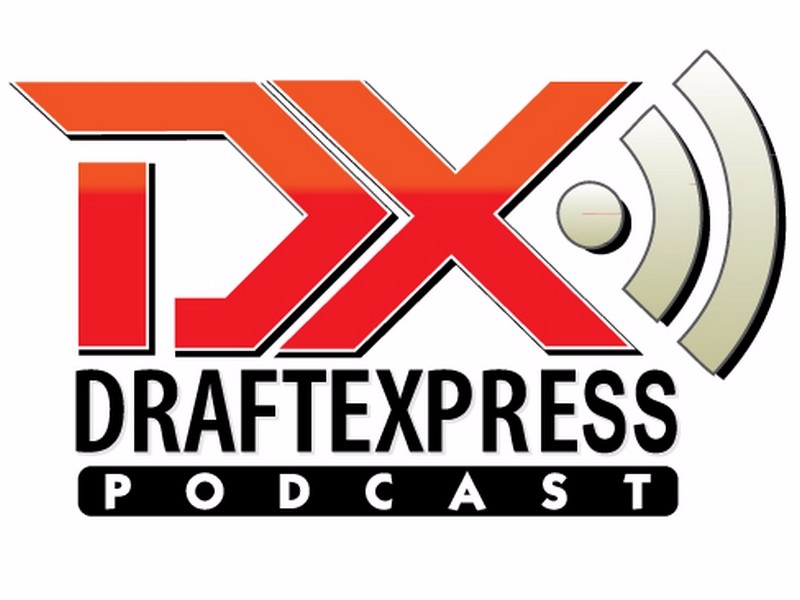
JONATHAN GIVONY: So, Mr. Colangelo, I saw that you talked to the players in the morning, but we couldnt exactly hear what you were saying. Can you tell us what were you talking about?
JERRY COLANGELO: Basically, I wanted to give the players a perspective about what this is all about, that its an honor to represent your country, to have USA across your jersey. Its not an entitlement, its something you earn.
Then I walked them through the experience with the Olympic Team last summer and how they all gave up their individual egos, it was about we, and team, and it wasnt about I. It was all worth the effort and the time, and this is a great opportunity, take advantage of it, if you all aspire to represent your country on the Olympic Team, this is just a step, and you have to pay your dues. You have to keep yourself clean on and off the floor, and you need to stay focused. Life is short, you only come around once, and from here to your school situation, make the most of it.
In other words, encouraging them, kind of laying out a format for how the whole system works, how the pipeline works, and to encourage them. So that they know that if they get the job done, I said I know you will, I dont know which of you, are going to be representing your country in the Olympics. I was trying to give them a little oomph and encourage them.
JONATHAN GIVONY: A lot of these guys were McDonalds All Americans, they were the top players in their cities, their high schools, their AAU teams, etc. Now, theyve never been in a situation before where they actually have to make a team, where they might get cut. What do you think that does for them in a setting like this?
JERRY COLANGELO: First of all, thats life in the big city. The higher up you go, the more competitive it is, and the more people who have been getting all the accolades in the past mean nothing, because the playing field, or the playing court is the equalizer. Those who earn it, those who are deserving will be the survivors.
So, the true competitor looks forward to that, and looks forward to competing with the very best. Its pretty easy to see players who have the physical skills. It doesnt take a genius to identify runners and jumpers and shooters and defenders, etc. Its a lot of the intangibles. Its the body language, its the focus.
If you could make two incisions, one over the forehead, one over the heart, youd find out for sure what you have. But the competitor wants to go. Wants to keep pushing himself, because he wants to be the best. If you want to be the best, you have to play against the best, and the higher up you go in this whole program, the more competitive it is, and a lot of guys with great credentials wont make it. Thats the way it should be.
JONATHAN GIVONY: Nineteen players, I was told, declined their invites to the Under-19 team, why do you think that is?
JERRY COLANGELO: Well, since Ive been here, weve had discussion about that. Its pretty obvious, weve got total buy in regarding everything were talking about. Usually you start on the bottom and build a foundation, and build a program working up. I came in at the top, and built a program working down. So weve got the NBA players, weve got the upper echelon totally bought in, weve got the younger guys like first and second year pros who are the next grouping, theyre all showing up this summer at the camp in July. Theres buy in there, theres buy in on the sixteen year olds.
The nineteen year old thing is kind of a blip on the screen. It takes some getting into. We could just say, Okay, thats just the way it is. I dont buy that, thats not the way I operate. Some of them are summer school, some of the players fathers want to work with them one-on-one, they think they get better instruction that way. I differ with that, but thats an opinion.
The NCAA allows teams to make major trips and they have tutors with them. Im suggesting that we have tutors with our players, so we eliminate that piece of it. Even the coaches have their own agendas, they keep these kids eligible, and so on and so forth. I understand all of that, and we just have to work through it.
JONATHAN GIVONY: In a lot of countries, like Spain for example, Lithuania, Serbia, theres kind of a rite of passage that happens, where guys start on the junior national team, then if theyre good enough they move up to the senior national team. Theres kind of a backlash if they dont go through that process, by refusing an invite to one of the national teams or something like that. Why dont we see that same mentality here in the States?
JERRY COLANGELO: Well, first of all, I think weve changed the culture here in the States, and there is an expectation level, so whatever happened in the past with USA Basketball before my tenure began, really is irrelevant.
Lets put it this way, I saw what the other countries did, and admired what they did in building their national programs, in keeping these young guys together for the number of years. Basketball is the ultimate, consummate team game. It has been proven, because weve been on the losing end, good basketball teams can beat all-star teams, more talented teams.
We have an education-based structure here in the United States, thats not true anywhere else. So, our coaches are limited by the number of hours they can be with their players, in AAU basketball which is huge, kids dont work on their games necessarily, they play games in the offseason, and yet you look at the other more successful programs around the world, its almost like theyre at an institute to play basketball, hours and hours a day.
There are no academic requirements or prohibitions, so what would you expect? I would expect guys, when theyre 19 or 20, to be pretty fundamentally sound, which they are, be able to shoot the ball, which they are, to be able to understand the nuances of the game, which they do. Thats not the way were structured.
One of the things I said when I took over is, were going to a national team concept. For the first time, we have a national team roster. Its fluid, we can add and subtract, whatever is required at any given time. What Ive tried to do is put new infrastructure in place, its a pipeline, and were a work in progress. It has nothing to do with how our disconnect or anything, thats old stuff- doesnt mean anything.
JONATHAN GIVONY: Is there any thought about maybe putting in a rule where, if you want to play for the senior national team, you cannot decline an invite the U-19s? That would automatically rule you out from competing with the US in the future? Clearly the top prospects in this age group just arent here. There are some excellent players, I think that its a nice group, but its not the top group of guys in terms of prospects.
JERRY COLANGELO: Well, Im going to the academic structure we have here in the United States, which is part of the problem. You have coaches that have their concerns; coaches have to win, coaches want the players eligible. Were at that age bracket, thats just where its the tipping point.
I dont have a solution, other than what Ive said to you is that we should address it, we should seek help from the NCAA regarding tutoring, I mean one of the reasons these kids arent here is that they have to go to summer school. Well, were going to get a lot more kids who would be here, if that was accurately the reason.
Its hard to compete with a father who says, I could do better with my son than this great group of coaches. I can disagree with it, but thats still his opinion and it probably would prevail.
So, Im not sure you can ever legislate, nor should you necessarily, I think you encourage, you try to make it pretty clear, that we think its important to be in the pipeline. If youre not in the pipeline, your expectations should be limited, because just like I told our players the last three or four years, those who have paid their dues have built up equity. You cant just show up in an Olympic year and expect, I dont care who you are, that just doesnt fly.
So, I think over a period of time, that message will get across. See if you get to the sixteen year olds, like we have, theyre going to get it, and theyre going to be nineteen pretty soon. So theyll think twice about not participating, if theyre being encouraged to do that. Okay so we have a little blip this year, with this group, and we get these players; were going to address them. Well see if we can improve upon it and work on it.
JONATHAN GIVONY: In terms of what you guys are doing here, how much of this is about developing the players and how much of it is about going out and getting the gold medal?
JERRY COLANGELO: Well, realistically you dont have the kind of time, the time thats required to really work on development. Now, the mere fact that youre playing competitively with this level of competition here in the States, that makes you a better player, no question about that.
Number two, playing against world competition makes you a better player, so in effect youre working on your game. Its a lot different than playing in the summer league, when youre playing five games in one day. Youre not working on your fundamentals, I dont think.
So, the training camps, where you have some duration of time, is when you get a lot more into the development. I know the players weve had, weve had for three years, are much better players after the Olympics experience than they were when they started, and I mean fundamentally. From the 05, 05 I think we participated, 06, 07, and 08, it was the camps. We had a lot of camp time, and I think thats where the improvement took place.
JONATHAN GIVONY: Theres a lot of criticism in the mass media of American basketball, how AAU is controlled by the sneaker companies, how our development system is broken, a lot of things that weve talked about in this conversation. How much responsibility does USA basketball feel to take part in fixing the issues we have in American basketball?
JERRY COLANGELO: Today USA basketball has a single-minded purpose, which is to field teams that represent the United States in international competition. On a personal basis, I think USA basketball has infrastructure, and should be the entity to address everything youre talking about.
The recent announcement of the NBA and the NCAA with the Youth Initiative, thats what that is supposed to be also. Thats just getting started, and theyre concentrating on a website for information, et cetera. In a perfect world, everyone would come together, Youth Initiative and USA basketball and we address a lot of those issues.
What I said earlier about coming in, starting at the top and working down is different than starting at the bottom and working up. But I do think, because weve had success at the top, it has already funneled down pretty well, short of the blip at the nineteen year olds. Everyone else, they get it, everyone is buying in. Well its a great platform from which to address these issues. Ultimately, thats what Id like to see happen.
JONATHAN GIVONY: Is Barack Obama going to be good for American basketball? Are there things he can do to help out?
JERRY COLANGELO: Having been a left-handed basketball player myself, knowing that hes left-handed, I think that hes got a great shot to give us a lift.
Seriously, I love the fact that he loves the game. And am therefore hopeful that he will have an open ear towards addressing a lot of the issues that are out there. I mean, it would be nice to clean up the mess. Id like to see better coaches with younger players, I would like to have more talented players, some of the rules are archaic, they need to be addressed. The way its structured, the people who have more time with the players should have less time with the players, I mean its upside-down. So, it seems overwhelming, its a big big deal because its pretty entrenched, but it would be fun to kind of go at it.
JONATHAN GIVONY: Thanks so much for your time, Mr. Colangelo, I really appreciate it.
























Comments